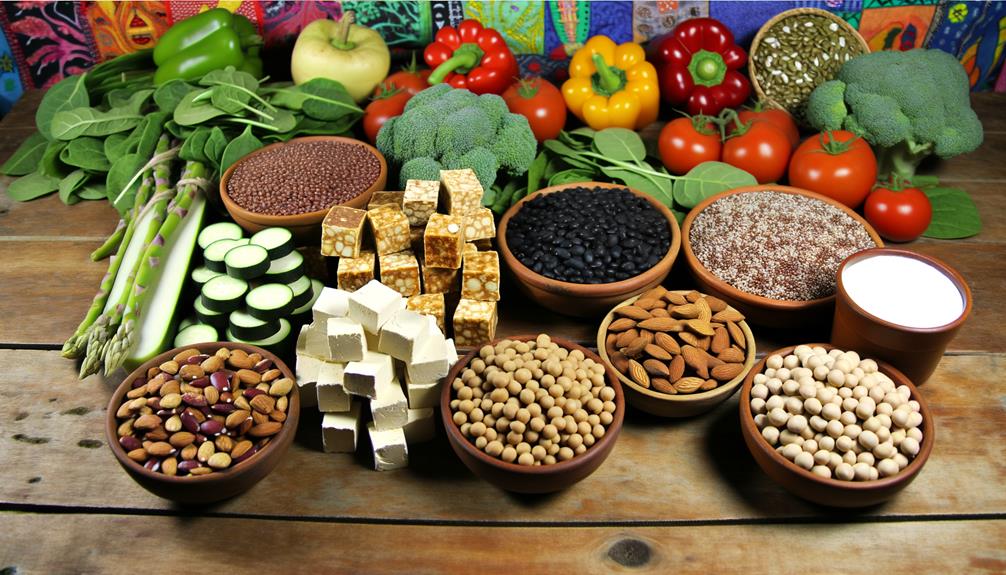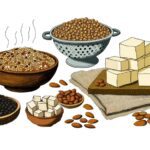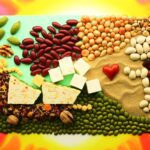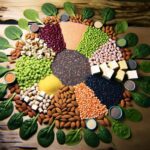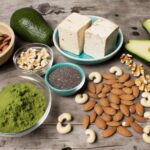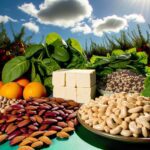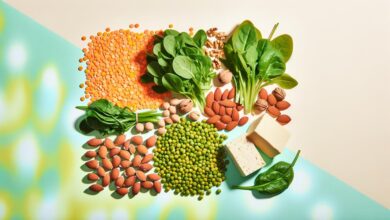As you venture into the vibrant world of veganism, you might wonder where to wander for your protein punch. It's a common misconception that a plant-based diet can't provide sufficient protein, but this couldn't be farther from the truth. Legumes like lentils and beans, nuts and seeds, and soy products such as tofu and tempeh are just the tip of the proverbial protein iceberg. Whole grains and specialized plant-based protein powders also offer robust options to ensure you're meeting your nutritional needs. However, the question isn't just which foods contain protein, but how to integrate them into your daily diet in a way that's both satisfying and culturally rich. As this discussion unfolds, you'll find that the possibilities for high-protein vegan meals are as diverse as they are delicious, and you may be surprised at the culinary adventures that await on your plate.
Key Takeaways
- Legumes and lentils are protein-packed staples in many cultures, providing a sustainable source of protein for nourishing meals.
- Nuts and seeds, such as almonds, chia seeds, hemp seeds, walnuts, and pumpkin seeds, are high in protein and offer various health benefits.
- Plant-based protein powders, such as pea protein, brown rice protein, and hemp protein, provide a quick and concentrated source of vegan protein.
- Whole grains like quinoa, amaranth, teff, spelt, and buckwheat are natural ways to boost protein intake and offer unique flavors.
Legumes and Lentils
Diving into the heart of plant-based protein, you'll find legumes and lentils as powerhouse staples that are both nourishing and versatile. These humble ingredients are the unsung heroes of many cultures, providing a foundation for meals that sustain and energize communities.
Whether you're whipping up a soulful stew or crafting a hearty salad, legumes and lentils offer a protein-packed base that's as kind to the planet as it is to the human body. They're not just food; they're a story of sustainability and respect for the earth's resources.
In the realm of innovation, pea protein emerges as a game-changer, transforming the way you think about fitness and wellness. It's a clean, high-quality protein source that's perfect for shakes, baking, or even as a meat substitute, making it a go-to for those who serve others through nourishment.
And let's not overlook chickpea pasta, a culinary twist that brings a protein punch to your favorite comfort dishes. Imagine serving up a bowl of this guilt-free pasta to friends and family, knowing that you're providing them with a meal that's not only satisfying but also aligns with a compassionate, health-conscious lifestyle.
Nuts and Seeds
As you explore the vast landscape of plant-based proteins, don't overlook the mighty contributions of nuts and seeds, which offer a rich tapestry of flavors and benefits to your diet. They're not just for snacking; nuts and seeds are versatile ingredients that can be transformed into creamy milks, robust sauces, and even serve as the base for vegan cheeses and meat substitutes. They're true culinary chameleons with impressive nutritional profiles that support your body's needs.
Here are a few top picks to consider:
- Almonds: High in protein and vitamin E, perfect for heart health.
- Chia Seeds: Loaded with omega-3 fatty acids and fiber, and they gel beautifully when soaked.
- Hemp Seeds: A complete protein source that's also rich in essential fatty acids.
- Walnuts: Brain-boosting with a good dose of plant-based omega-3s.
- Pumpkin Seeds: A fantastic source of zinc, which supports immune function.
Plant-Based Protein Powders
For those seeking a quick and concentrated source of vegan protein, plant-based protein powders are a game-changer in your nutritional arsenal. These powders boost your protein intake with minimal fuss, supporting your active lifestyle or serving your body's needs in a plant-strong way. They're perfect when you're on-the-go or after a workout, and they come in a variety of powder flavors to suit your taste.
Protein bioavailability is crucial; it's how effectively your body can use the protein you provide it. Vegan protein powders are designed for optimal absorption, so you're not just consuming protein—you're ensuring it counts. Here's a glance at some popular options:
| Protein Source | Grams of Protein Per Serving | Typical Flavors |
|---|---|---|
| Pea Protein | 20-25 | Chocolate, Vanilla |
| Brown Rice Protein | 15-20 | Berry, Natural |
| Hemp Protein | 10-15 | Original, Cocoa |
Whole Grains
Beyond the convenience of protein powders, incorporating whole grains into your diet is an essential way to naturally boost your protein intake. These nutritional powerhouses aren't just about carbs; they offer a wholesome spectrum of benefits, including a decent amount of protein that can help you meet your daily needs while nourishing others with your plant-based choices.
Ancient grains, in particular, are revered for their rich nutritional profiles and have been sustaining civilizations for millennia. They're not just a trendy health food; they're a testament to the wisdom of our ancestors. Here are some of the most protein-rich whole grains to consider:
- Quinoa: A complete protein containing all nine essential amino acids.
- Amaranth: A pseudo-grain that's naturally gluten-free and packed with protein.
- Teff: Small in size but mighty in nutrients, it's a staple in Ethiopian cuisine.
- Spelt: An ancient variety of wheat with a nutty flavor and high protein content.
- Buckwheat: Despite its name, it's gluten-free and offers a good protein punch.
To maximize their nutritional value and make them easier to digest, don't forget the importance of grain soaking. This simple, traditional practice can enhance the bioavailability of nutrients and make your wholesome meals even more beneficial for those you're serving. Embrace these ancient grains and let them bring a world of flavor and nutrition to your compassionate table.
Soy Products
Diving into the world of soy products, you'll find a versatile array of high-protein options that are staples in many vegan diets. Soybeans themselves are a powerhouse, offering a complete protein profile, which means they contain all nine essential amino acids your body needs.
Soy versatility shines through in products like tofu, tempeh, and edamame. Tofu, in particular, is a chameleon in the kitchen. It absorbs flavors beautifully, making it perfect for a variety of dishes. Your tofu preparation can be as simple as stir-frying with your favorite veggies and sauce, or as intricate as crafting a savory tofu scramble that echoes the warmth of scrambled eggs, without any animal product.
Tempeh, a fermented soybean product, brings a nutty flavor and satisfying bite to your meals. It's outstanding in vegan chili or as a protein-rich salad topper. Edamame, young soybeans often enjoyed steamed with a pinch of salt, provide a quick, protein-packed snack or side dish.
Frequently Asked Questions
Can a Vegan Diet Provide Enough Protein for Athletes or Bodybuilders?
Yes, you can get enough protein on a vegan diet. Protein supplementation isn't always necessary. Dispelling vegan myths, even athletes can thrive plant-based, with foods like lentils and quinoa serving your body well.
Are There Any Fruits That Are Surprisingly High in Protein Suitable for Vegans?
Peel away fruity misconceptions; guava and jackfruit are protein-packed berries in vegan gardens. They'll fuel your service to others with plant-based strength, authentically nurturing your body and the community you care for.
How Do I Ensure I'm Getting All Essential Amino Acids on a Vegan Diet?
You'll want to focus on diverse plant-based sources and forget the protein-combining myth. Amino acid supplementation isn't typically necessary if your diet's varied. Serve others by sharing this holistic, compassionate approach to nutrition.
What Are Some High-Protein Vegan Snack Options for On-The-Go?
Pack your bags with vegan jerky alternatives that'll knock your socks off! Dip into protein-packed spreads that serve your body and soul, keeping you fueled and compassionate on every adventure.
Can Eating Too Much Plant-Based Protein Have Negative Health Effects?
Yes, overconsumption of protein supplements can strain your kidney function, so it's crucial to balance your intake with your body's needs, especially when you're committed to nourishing others with mindful, plant-based choices.
